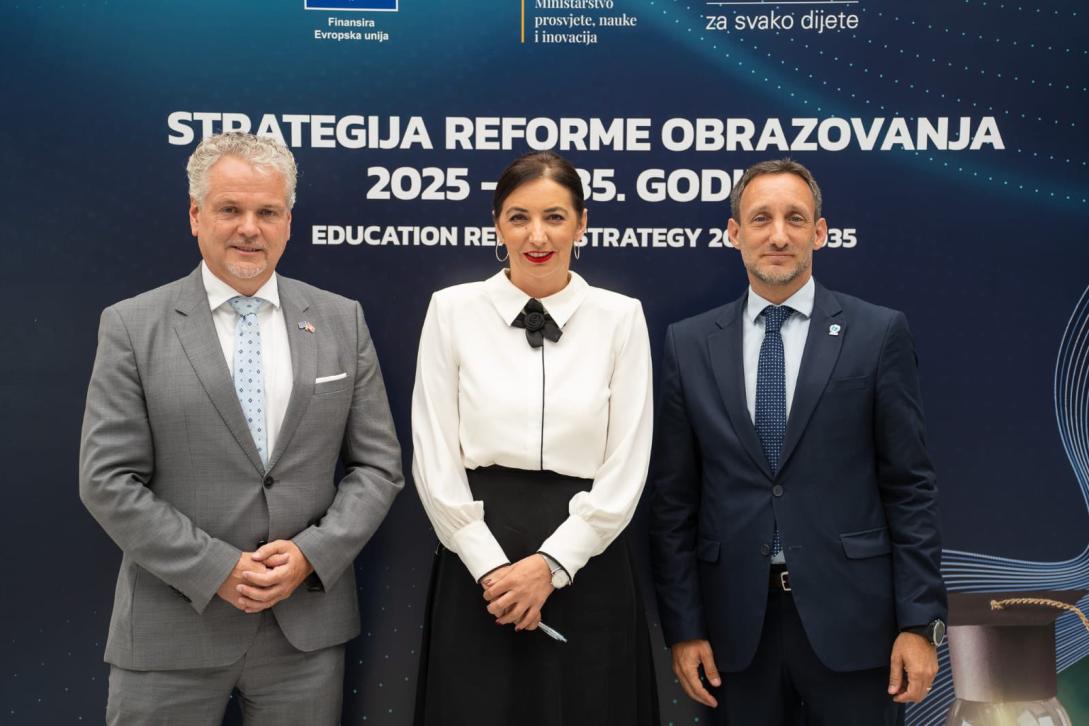UNICEF and the EU support the development of a comprehensive education strategy for the next 10 years

The Government of Montenegro has adopted a new Education Reform Strategy for the period 2025–2035 – the first document to encompass all levels of education, from early childhood to secondary education, including teacher education. The Strategy lays the foundation for long-term, systemic change with the goal of ensuring that every child has access to quality education that builds the skills and knowledge needed for life in the 21st century.
The Strategy was developed through the initiative “Quality education for all children in Montenegro,” in partnership with the Ministry of Education, Science and Innovation, the Delegation of the European Union to Montenegro, and UNICEF.
“UNICEF, in cooperation with the EU, supported the Ministry of Education, Science and Innovation in developing this Strategy – not only through data and expert support, but also by including the voices of those who know the education system best: children, parents, and teachers,” said Michele Servadei, UNICEF Representative in Montenegro.
“More than 1,100 students, 2,800 teachers, and 5,700 parents shared their views. Their recommendations shaped every part of this Strategy. Now we must implement it. That requires consistent investment from the national budget – year after year.”
Michele Servadei, UNICEF Representative in Montenegro
The Strategy is based on:
- a comprehensive sector analysis,
- national and international research,
- consultations with children, parents, teachers, and school management.
It has been designed in line with Montenegro’s 2024–2027 Reform Agenda and represents a key step toward education as a pillar of social development under the new EU Growth Plan for the Western Balkans.
The Strategy addresses the everyday challenges in the education system, including:
- overcrowded classrooms,
- insufficient support for teachers,
- outdated teaching methods,
- deteriorating infrastructure,
- lack of equal opportunities for children from vulnerable groups such as those living in poverty, Roma and Egyptian children, and children with developmental disabilities.
It also tackles often overlooked issues such as:
- mental health,
- social-emotional learning,
- gender equality,
- child safety in schools,
- violence prevention,
- digital competencies,
- school preparedness for emergencies such as floods, earthquakes, or pandemics.
The four main objectives of the Strategy are:
- Improving the quality and equity of education, so that every child – whether they have developmental difficulties, come from low-income families, or speak a minority language – learns in a safe and supportive environment.
- Supporting teachers through improved training and by strengthening school teams with psychologists, pedagogues, and social workers.
- More effective governance and financing of education, with clear accountability mechanisms and directing resources where they are most needed.
- Modernizing school infrastructure, including digitalization and adapting facilities to be inclusive, safe, and resilient to climate change.
At the Strategy's launch at the Montenegrin Academy of Sciences and Arts, Minister of Education, Science and Innovation, Anđela Jakšić-Stojanović, stated:
“We identified challenges, asked questions, and searched for answers. We wanted to listen to the needs of all participants in the education process because we knew that only in this way could we bring about real changes in our education system. That is why, in cooperation with UNICEF, the Association of Psychologists of Montenegro, and the NGO ‘Parents’, we conducted a consultation process with children, parents, teaching staff, professional associates, and school administrators.”
The EU Ambassador to Montenegro, Johann Sattler, expressed satisfaction with the EU’s support for this process and emphasized the importance of a strategic approach:
“Education is the foundation of society – it shapes who we are and what we strive for. A strong education system fosters labor market development, which in turn drives economic growth and generates the prosperity necessary for societal progress. The quality of education – not natural resources – is the best predictor of a country’s success.”
The Strategy will not be measured by the number of pages it contains, but by the number of lives it transforms:
- children who feel safe, supported, and motivated to learn,
- teachers who have the support and knowledge to develop each student’s potential,
- schools that become engines of equity and development.
UNICEF remains committed to working with the Government of Montenegro, the European Union, and other partners to help make this vision a reality.
Download the Strategy HERE.





